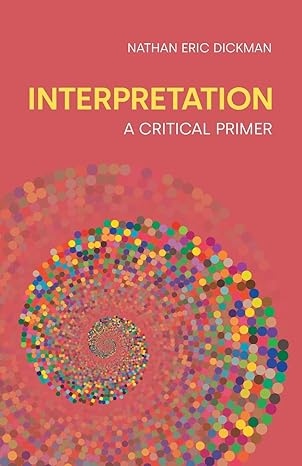Interpretation - A Critical Primer, by Nathan Eric Dickman
Examines the nature of interpretation - an interesting subject, but the language is highly technical
 Interpretation - A Critical Primer
Interpretation - A Critical Primer
By Nathan Eric Dickman
Equinox
ISBN 978 1 80050 337 3
Reviewed by Alec Gilmore
First, in case 'Interpretation' immediately takes you to words and texts we are politely reminded that it also embraces other worlds including art and painting, theatre and drama, music, dance and even video games. Two or three of these worlds of which I had little or no experience whetted my appetite for a learning experience, only to be disappointed. This book is texts, predominantly religious and mostly Christian, finding myself in the world of Philosophy of Religion where I knew little or nothing more than names (Derrida Ricoeur, Tillich, Schleiermacher, Wittgenstein . . . &c.) but if that is what you want, go for it.
Second, come the fundamental questions. Content is crucial. Maths is one thing, personal opinion and judgement another. What is interpretation and how does it it differ from explanation? Does every text have to have a meaning, and if it does, what is it, how do I determine it and who decides whether it is right, wrong or even tenable? To what extent is the interpretation dependent on the creator, the background and atmosphere when it was first created and then used with a different location and timing?
Third, the interpretation arrived at is not necessarily the interpretation intended as the receiver brings something of themselves to the interpretation. In an art exhibition a viewer will spot something which the artist did not know was there. Such varieties of interpretations open the door to discussion which then means another batch of issues come into play, but don’t expect simple and agreed one line answers. As so often in philosophy, interpretation is long on questions but short on answers.
A most useful feature for a newcomer is the two-and-a-half pages at the end of the Introduction summarising the five chapters.
Chapter One addresses some of the issues raised above, mainly the problems of interpretation and reader response. Chapter Two adopts a subjective approach to the reader or viewer with matters of history, culture, prejudice and language. Chapter Three deals with the medium of communication, Language in particular. Chapter Four focuses more on the impact of written texts (classic especially) and the way you are facing (Forward, North or Mecca?). Chapter Five introduces Social Aspects exploring the effects of institutional elements and how they can change lives, followed by a final shot that there is no such thing as 'absolute understanding'.
My one disappointment is the wide gap between the human and basic issues on the one hand, and the highly technical language then used to address them in the body of the book on the other, like the preacher with a gift for getting on the wavelength of his congregation and then blinding them with science, doctrine and dogma way beyond their comprehension. In short, I found it very difficult to read, something in which I had a genuine interest and a capacity to understand but slight background. Why did it have to be made so difficult! Perhaps a volume on Communication is yet to come..
Alec Gilmore is a Baptist minister
Baptist Times, 08/12/2023